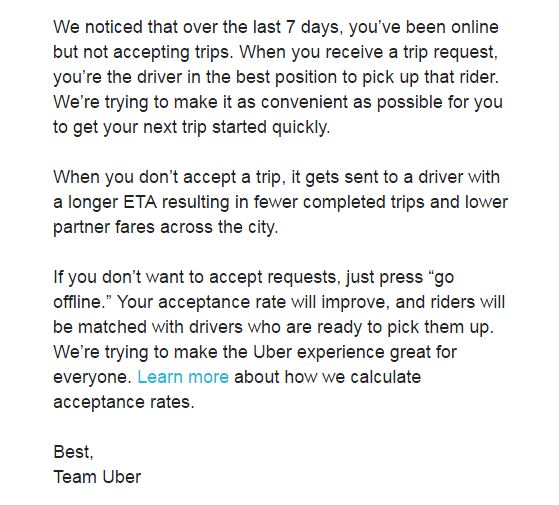This article went viral a few weeks ago: Mr. Money Mustache, UBER Driver
In summary, after factoring in costs, his earning were about $7/hour, and he concludes it isn’t worth it:
But in the end, it was hard to stay motivated to keep doing this experiment. There is just usually something better to do than driving around in a car, and I wasn’t willing to sacrifice too much of my life to gather more data. And with the financial gain of rideshare driving being negligble, I am surprised that there are so many people who do it.
Mr. Money makes the implicit assumption that someone can find a better way to make money and that driving an Uber comes with a large opportunity cost, but that is not always the case. $7/hour driving pays more than an hour watching TV doing nothing. If you’re like Mr. Money, who makes tons of money writing a hugely popular personal finance blog, then, yeah, driving an Uber is a poor allocation of one’s time, but most people aren’t in such a fortunate situation. As it turns out, even low-paying, low-status ‘traditional’ jobs can be hard to obtain, leaving low-skilled people with little recourse. During a 2011 McDonald’s ‘hiring day’, over 1 million people applied for just 50,000 openings–an acceptance rate lower than Harvard. There are a lot of low & medium-IQ people who are not working. The ‘official’ unemployment rate, as we all know, does not take into account the long-term unemployed.
And then towards the end of the article he has a fit because Uber tells him he cannot keep his app idle and not take rides:
I was surprised that both companies immediately dismissed all of these suggestions, with a round of vague excuses. This was a disappointment to the Economic Libertarian in me, because it seems obvious that an open market between buyer and seller is the key to more efficiency.
In fact, early in my driving career I learned how much the unpaid driving was hurting my profitability so I stopped accepting distant fares. The app quickly sent me this note:
Yeah, right. How about you just stop ringing me with fares that are ridiculously far away, or give me the opportunity to GET PAID FOR THE DRIVING, instead?
When these companies deliberately tilt the field, they are being sneaky, which causes them to lose public trust, which causes the public to vote in a bunch of sclerotic regulation to protect the drivers and the public. If you, as a company, just avoid being a dick to people in the first place and treat them with complete openness and good old-fashioned honesty, they are more likely to let you run free.
So unless he gets his way, the government should intercede (or at least that gives justification for regulation). He fails to understand in a free market, companies set their prices/terms, and consumers set their preferences, and they meet somewhere in the middle. If drivers fell like they are getting a bad deal, they can either: stop using Uber or choose a competitor such as Lyft.
He also writes:
Since I started this experiment a year ago, Uber has fallen into a world of trouble and bad publicity. Their internal culture of sexual harassment was blown wide open, along with the misdeeds of the wild and temperamental former CEO. From specific programs to evade government regulation to annoying treatment of drivers, Uber triggered a widespread backlash which became the #deleteuber campaign. Saying “Uber” is now a bit like uttering the words “ConAgra” or “Philip Morris” or “Exxon”.
So Mr. Money is siding with the false sexism accusers, which is further evidence he’s not a libertarian. I remember in 2015, when Uber began getting a lot of bad press by the liberal media, I correctly $50-billion-dollar valuation, indicating that despite the best efforts by the left to soil Uber and its CEO, investors and customers have not lost faith in Uber. Same for Tesla, another high-tech American capitalism success story that is a frequent target of the left (due to factory conditions, unionization, etc.).
